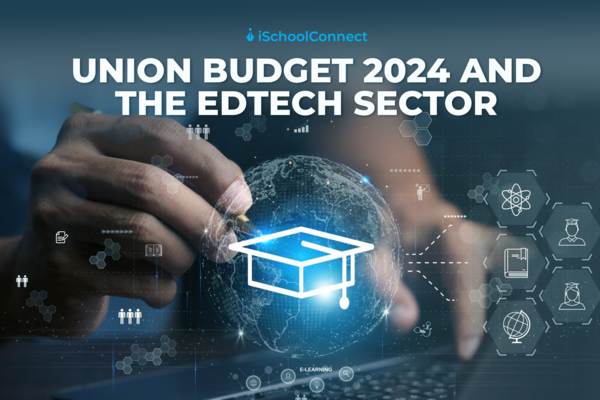Table of Contents
Why the excitement?
The EdTech sector in India eagerly awaits the upcoming Union Budget 2024 (Interim), with expectations set on potential support for its burgeoning growth. This anticipation stems from the sector’s recent surge, fueled by factors like increased internet accessibility. Also a growing demand for high-quality education, and governmental efforts to promote digital learning.
Boosting digital infrastructure
One of the primary expectations from the budget is a strategic focus on boosting digital infrastructure. Acknowledging that improved digital infrastructure is crucial for any EdTech initiative, there is a call to allocate more resources, especially in rural areas, to enhance high-speed internet availability. This allocation aims to bridge the digital divide, ensuring equitable opportunities for quality education. Anticipated budget allocations include funds for digital classrooms, providing devices to students and teachers, and training educators on effective technology integration in teaching methods.
AI integration in line with NEP 2020 to personalize education
Aligning with the National Education Policy (NEP) of 2020, the second expectation centers around the integration of Artificial Intelligence (AI) in EdTech. Recognizing the emphasis on personalized learning and skill development in the NEP. There is a call for encouraging research and development in AI-driven EdTech solutions. These solutions are envisioned to customize learning paths, assess student progress, and offer adaptable content to meet the objectives outlined in the NEP.

Tax relief and incentives
The third expectation revolves around fiscal measures such as reducing Goods and Services Tax (GST) rates on online educational materials and services. This reduction aims to make these resources more affordable for students and families. Additionally, proposed tax benefits for EdTech startups and investors are expected to attract increased investments and innovations. Such incentives may also foster the creation of educational content in regional languages. Which will cater to the diverse linguistic landscape of the country.
Internet accessibility in rural areas
Recognizing the importance of equal access to digital resources, especially in rural areas, the fourth expectation involves measures to enhance internet accessibility. Proposed initiatives include installing fiber optic cables, providing affordable internet plans for rural users, and creating community internet kiosks. Public-private collaborations with telecom companies are seen as potential accelerators for expanding internet services in rural regions.
Promoting research and development
The final expectation from the Union Budget 2024 is a focus on promoting research and development in the EdTech sector. This involves financial aid for research fellowships, dedicated EdTech incubators, and collaborative projects between universities and EdTech companies. These initiatives are envisioned to fuel creativity and establish a robust foundation for the future of education in India.
Addressing these five expectations through meticulous budget planning and policy actions holds the promise of unlocking the potential of EdTech in India. The envisioned outcomes include enhanced education quality and accessibility, empowerment of teachers. It also helps equipping students with the skills essential for a successful future. The Union Finance Minister’s presentation of the Interim Budget on February 01, 2024. Awaited with anticipation for the potential transformation it could bring to the EdTech landscape in the country.






